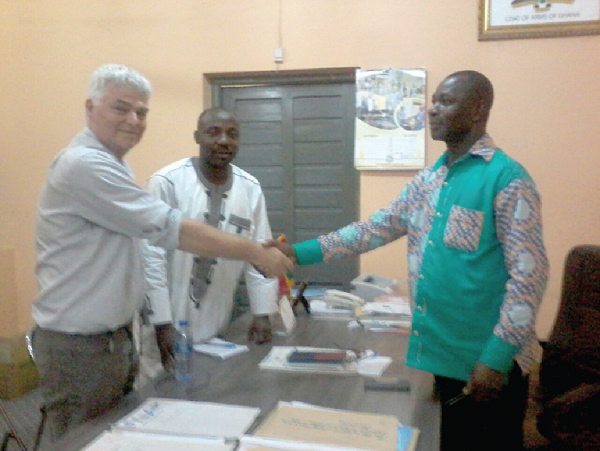
Jasikan assembly plans to establish three factories
The Jasikan District is capitalising on the government’s one-district, one-factory policy to speed up development in the district.
Advertisement
The district is reputed to be among the oldest districts in the country, being one of the four districts that was started in the Volta Region.
Compared to its contemporaries, namely Ho, Keta, and Kpando, it could be said that the pace of development in the Jasikan District has not been encouraging.
Currently, its peers have all attained the status of a municipality, with Ho even pushing for a metropolitan status.
As a means, therefore, to propel the district’s development, the Jasikan District Assembly has come up with an initiative dubbed, ‘one district, three factories’, similar to the government’s one-district, one-factory programme .
The three factories
The district is at the preparatory stage of establishing the three factories which will produce starch and ethanol from cassava, ceramics and tiles from the vast clay deposits in the area and products from ginger.
Under the circumstances, the district has been segmented into three parts namely; Western Buem, Central Buem and Eastern Buem as areas that will host the starch, ceramic tiles, and ginger factories, respectively.
According to the assembly, several investors have expressed interests in partnering it in a public-private partnership (PPP) arrangement.
The assembly is at the moment finalising agreement with a Chinese company, Multiple Sites Limited, for the construction of a cassava factory in the Akaah enclave in the district.
Additionally, it has acquired 20,000 acres of land, which is to be distributed among farmers in the district for the cultivation of cassava.
Besides the construction of the factory, the Chinese company will also provide planting materials and technical advice in the production of starch and ethanol for both local consumption and for export.
Already, there are surveyors marking the land for the construction of the factory, which is expected to commence by March next year.
In an interview with the Daily Graphic, the Jasikan District Chief Executive, Mr Lawrence Kwami Aziale, said the assembly was determined to work hard over the next four years to create employment, eradicate poverty and improve the standards of living of the people in the district generally.
He expressed the hope that when the plans initiated were implemented successfully, they would help address the problem of unemployment in the district.
Land to be distributed to farmers
According to the DCE, a large chunk of the land earmarked for cassava cultivation would be allocated to the youth. He said the strain of cassava to be planted was the type that took a period of four to six months to mature.
He said he was confident that the youth would stay to work in the district when the programme took off, and not leave to seek a living in other areas.
“Most of our young men migrate to Accra to seek lucrative jobs which are often unavailable and end up living in very deplorable conditions with some sleeping on the streets.
“They belong to responsible homes over here and would have loved to stay back but because there are no jobs, they are compelled to leave since they could not just sit idle doing nothing,” he said.
Mr Aziale said the district was blessed with mineral resources, including gold and an expansive deposit of clay, located in central portion of the district.
The clay deposit has been tested by the Geological Department and found to be good for the production of ceramics.
Investors’ keen interest
So far, he said, five investors had shown interest in the establishment of a ceramics factory and ‘we are currently liaising with them to commence business early next year’.
With regard to the ginger factory, the DCE said negotiations were still ongoing with some chiefs in the area for the release of about 17,000 acres for the purpose.
He said each year, the district produces over 50,000 tonnes of ginger some of which go waste because the farmers are unable to find markets for the produce.
‘This time round, we are exploring all avenues to add value to the product as well as go commercial with it,” he said.
A Canadian company, the BYKA Group, which had expressed interest in establishing a ginger factory, was already engaged with ginger farmers in the district to enable them to plant the crop in a pilot programme.
The founder and programmes manager of the company, Mr Greg Marsh, told the Daily Graphic that he was impressed with potential that existed in the district and was ready to enter a PPP arrangement with the assembly to pave way for it to commence business soon.
The company was at the moment training ginger farmers engaged in the pilot programme in proper ways of cultivating the crop to achieve yields required by the factory, which hopefully would begin production next year.
Employment
Mr Aziale said it was anticipated that when the three factories came on stream, they would each provide employment for about 200 people.
‘While the district assembly is hoping that about 200 people will be employed in each of the factories, we expect also that the ginger and cassava farms will absorb about 10,000 farmers with the harvesting and processing segments taking on a lot of women,” he said.



